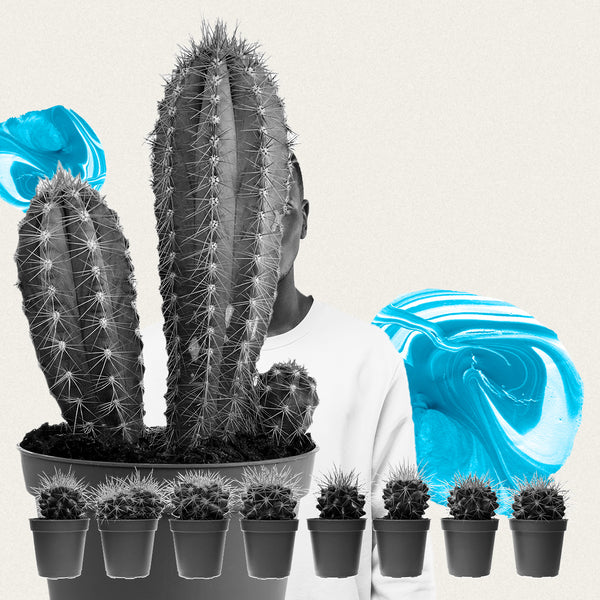Your hair can only look great if the skin that grows it is in good shape. In other words, scalp health is a natural extension of good skin health. Many of the issues that affect the scalp are the same as the skin. “For example, hormones increase the production of sebum, which keeps the hair follicles healthy but can lead to acne and other problems,” said Geologie founding dermatologist Dr. Steve.
Here are some factors that can affect the health of your scalp -- and what you can do about them.
In this article you’ll learn:
- The keys to a healthy scalp.
- Things to avoid to keep dandruff away.
- What it means when you have an itchy scalp.
- How often should you wash your hair?
- Should you exfoliate your scalp?
- Is scalp moisturizer a good idea?

Healthy follicles lead to healthier hair
Think of your hair as a crop. Just like a field of wheat can only grow in soil that is well tended, lustrous, strong hair comes from a scalp that is clean and functions as it should. Each strand of hair grows from, and through, a follicle that houses oil-producing sebaceous glands. These glands produce an oil called sebum, essential for lubricating our hair and skin. Without them, we would resemble the Crypt Keeper going through a dry spell.
Keeping the surface of the skin, and these follicles, clean and unobstructed by dirt or bacteria helps maintain the right medium for healthy hair to grow in. As the skin continually sheds cells onto its surface, it is important to keep the skin clear by washing and brushing hair.
How to know if you have dandruff — and what you can do about It
Although men have thicker skin on the scalp, dandruff affects men and women equally and can range from mild to severe. The kind where a few flakes might show on a dark sports jacket falls into the former category. For mild dandruff, keeping a specific shampoo around to address it usually does the trick.
Sometimes, however, oil and bacterial production can increase and — along with a poor diet and lax hygiene — can lead to excessive shedding or even infection. Some experts say to avoid things like too much dairy, as well as sugary, salty, and fatty foods. For more severe dandruff, try alternating two different dandruff shampoos every other wash.
What's the difference between dandruff vs. dry scalp?
Dandruff and dry scalp are very different. Dry, itchy scalp can be caused by a number of things that irritate your skin, such as:
- Eczema
- Sunburn
- Poison ivy
- Allergies to hair dye: Some people have allergic reactions to hair products, known as contact dermatitis, causing itching and rashes on the skin. Tip: Use hypoallergenic products.
- Scalp psoriasis: About 50% of people who have psoriasis on their bodies also develop symptoms on their scalp.
- Shampoo and product buildup: If you don’t rinse out shampoo properly when washing your hair, it can collect on the scalp and cause itching and flaking. Tip: Wash your hair at the beginning of your shower, not the end.
Dandruff, on the other hand, is essentially seborrheic dermatitis, an overreaction to a yeast called malassezia furfur. “When that happens, it manifests in your scalp as flaking, itching, redness, and scaling, which ends up on your shoulders on a black T shirt,” said Dr. Steve. “That’s dandruff, while itchy scalp is a symptom of dandruff.”
How often should you wash your hair?
There are as many answers to the question of how often to wash one’s hair as there are people with hair. “Some people can get away with a weekly shampoo,” said Dr. Steve. “Other people need daily cleansing.”
The minimum for most people seems to be at least every-other-day. For city dwellers who live in more polluted environments, a daily wash might be necessary because the particles that fill the air tend to cling to hair and scalp. As long as you keep the shafts of the hair and scalp moisturized, daily washing is fine.

Should you exfoliate your scalp?
Because -- for some of us -- the scalp is protected by a healthy amount of hair, it’s important to keep it clean by washing and brushing one’s hair. Neglect these activities and you can develop a build up of dead skin cells, dried sweat, sebum, and environmental pollutants.
Some people use an exfoliant once or twice a week and they think it’s a good idea. “I don't recommend it,” said Dr. Steve. “The scalp naturally exfoliates, and it’s hard to get topicals in there anyway — for people with hair.”
Scalp moisturizer — a good idea?
Getting moisturizer through most heads of hair is next to impossible — although some people with very short hair or African American hair can get hair oils in there. Some people use coconut oil, but that can also feed dandruff, because the yeast likes it.
Besides, said Dr. Steve, “The scalp produces its own moisturizer, which is far superior to anything you can buy.”
And most moisturizers and even some conditioners can leave a residue on the scalp that will lead to some of the problems listed above. It’s best just to let nature do its thing and make sure you keep your hair and scalp clean.































